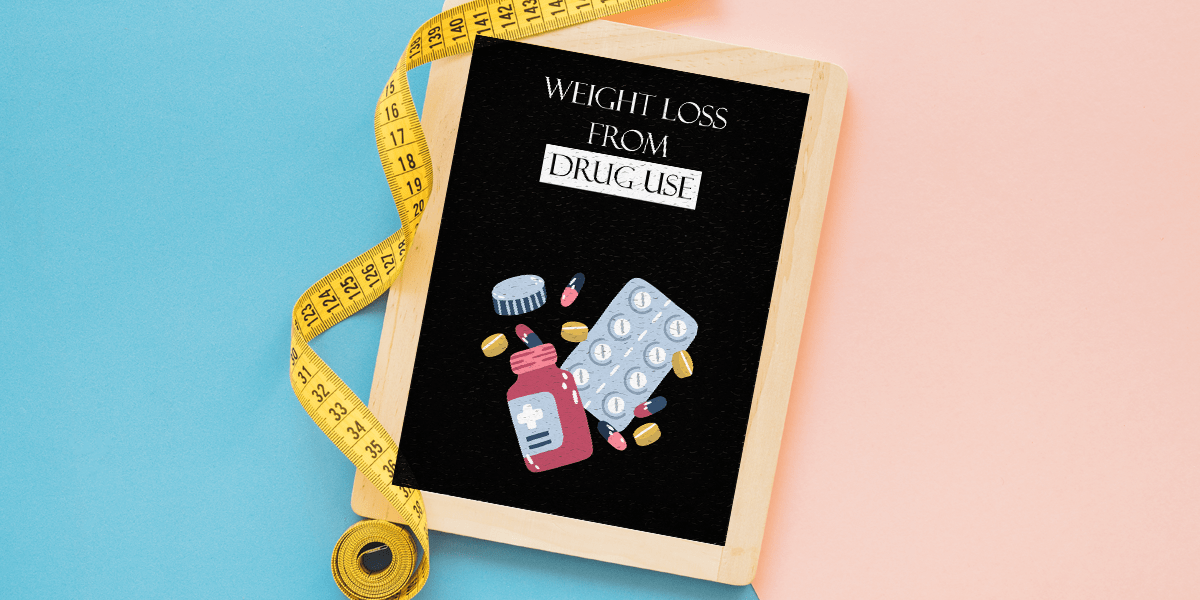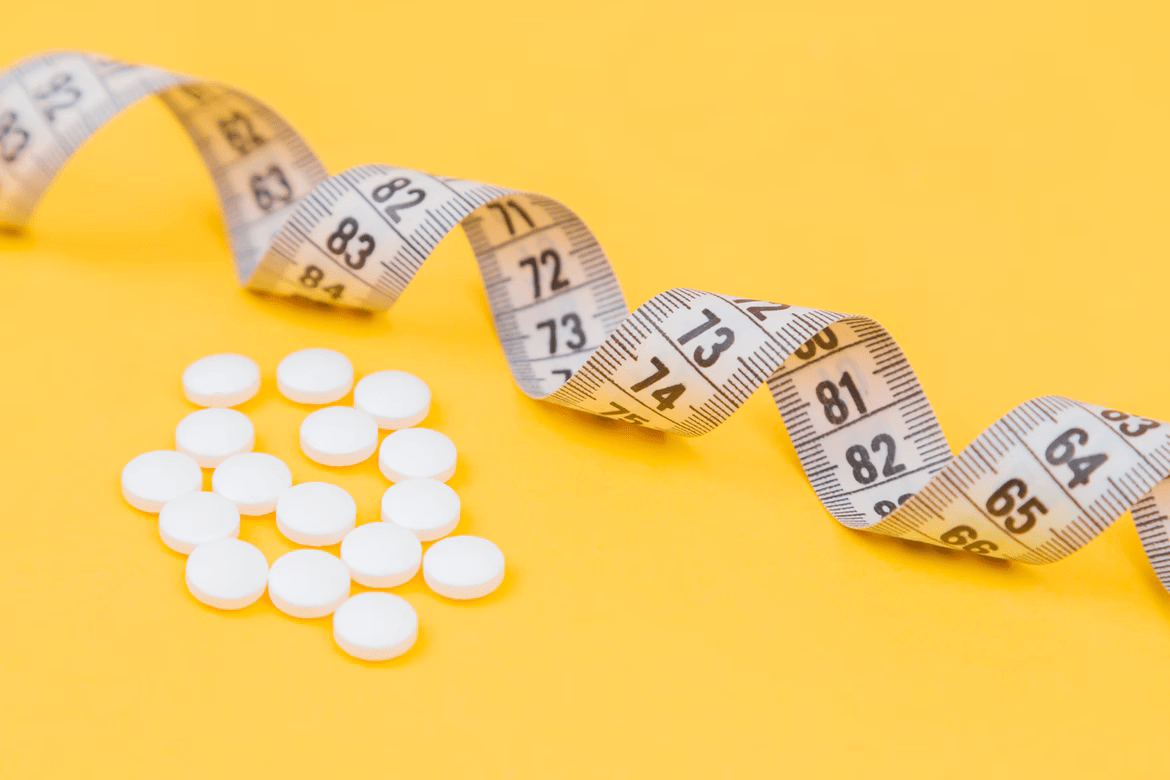
Weight loss from drug use is one of the more common symptoms or red flags that you may spot early on. Many drugs can contribute to reduced body weight. There are also multiple, specific ways they contribute to someone losing weight or body mass.
On the other hand, some drugs may cause weight gain, but this tends to be a less common side effect of substance misuse.
What Drugs Make You Lose Weight?
Rapid weight loss is a sign of addiction because substances can, directly and indirectly, cause weight loss.
Some of the drugs that are most commonly associated with weight loss include:
Stimulants
Stimulants include methamphetamine, cocaine, and sometimes we can characterize MDMA, also known as Molly or ecstasy, in this category.
- Stimulants, including both prescription drugs and illicit drugs, suppress appetite.
- Stimulant drugs can also change how the body metabolizes fat and calories. For example, researchers believe cocaine affects how your body stores and processes fat.
- Drugs like cocaine and other stimulants can also affect the central nervous system. These drugs speed up processes in the brain, dulling feelings of hunger.
- Prescription medicines for ADHD like Adderall are also commonly associated with weight loss.
- Adderall is a combination of amphetamine and dextroamphetamine. These are stimulants affecting brain chemicals.
- Rarely, Adderall is prescribed off-label for weight loss in obese people.
Crystal meth is one of the illegal drugs we most often think of as causing weight loss.
- Meth is a powerful stimulant.
- Crystal meth also has a significant potential for abuse and addiction.
- When someone abuses meth, they may have reduced appetite.
- The drug can cause them to lose fat and muscle and burn more calories.
- Indirectly, meth can contribute to weight loss by causing someone to stop taking care of themselves.
- When a person uses meth, there’s excessive dopamine in their brain. Those high levels of dopamine can decrease food cravings. When you don’t have an appetite, you don’t even think about eating. Your brain doesn’t receive hunger messages.
Generally, stimulants also increase the number of calories your body burns.
- Stimulant drugs cause heart rate, breathing, blood pressure, body temperature, and wakefulness to go up.
- All of these are processes requiring energy.
- When you use stimulants, and these processes speed up, you may burn calories faster.
- People who use stimulants can also stay awake sometimes for days at a time.
- You burn more calories when you’re awake compared to being asleep.
Opioids
While weight loss isn’t as commonly associated with opioids as with stimulants, it’s still possible.
Opioids include heroin and prescription pain medicines like oxycodone and hydrocodone. Opioids slow the central nervous system down, contributing to weight gain.
Symptoms of opioids can also include nausea and vomiting, which can cause weight loss.
Alcohol
Excessive alcohol use can damage your entire body. Some people may gain weight if they use alcohol excessively, but weight loss can occur for other people. One reason alcohol contributes to weight loss is that it damages your internal organs, intestines, and stomach lining.
When these parts of your body are impaired, it can impact your ability to absorb nutrients. Other side effects of alcoholism contribute to weight loss, including vomiting and diarrhea.
Drinking excessively can harm the liver’s ability to process toxins, causing damage to the organ or potential failure. Liver problems can lead to GI issues and nausea, leading to weight loss.
Indirect Causes of Weight Loss From Drug Use
While stimulants can physiologically affect the body and contribute to weight loss, drug and alcohol abuse can cause weight loss for less direct reasons. For example, someone who’s using drugs or alcohol may have a change in their lifestyle.
They may stop caring about ensuring they’re eating well or getting the proper nutrients. When they have an addiction, the focus of someone’s life is usually on the drug or alcohol. They don’t care as much about eating at the proper times. Eating may not be a priority at all, let alone eating nutritious foods.
Someone who’s in an active addiction doesn’t prioritize self-care, such as getting regular exercise or eating a healthy diet.

Other Signs of Drug Use or Addiction
Along with weight loss from drug use, there are other signs you may notice in someone who’s using drugs or alcohol.
Substance use disorders can change how someone looks, acts, and feels. The symptoms of drug use can be behavioral, physical, and psychological.
Physical Signs of Addiction
While weight loss is one we often think about first, other physical signs of addiction include:
- Runny nose
- Tremors
- Seizures
- Problems with coordination
- Lethargy
- Chemical odors coming from the breath or clothes
- Pinpoint pupils
- Eyes that are red or watery
- Changes in eating habits
- Jaw clenching
- Problems falling asleep
- Irregular sleep habits
- Skin marks
- Lack of personal hygiene
Behavioral Symptoms of Addiction
- Changes in hobbies or normal activities
- Changes in friend groups or social circles
- Less participation in family events
- Declining performance at school or work
- Lying or deceit
- Legal problems
- Secretive behavior
- Isolation
- Lack of care about responsibilities
- Financial problems
Psychological Signs of a Substance Use Disorder
- Personality changes
- Mental illness symptoms, such as anxiety or depression
- Paranoia
- Fear
- Obsessive thoughts
- Negative self-image
- Poor outlook on life
- Emotional withdrawal
- Loss of motivation
- Apathy or lack of interest
What If You Notice the Red Flags of Substance Abuse?
If you notice the signs of substance abuse in your teen, first, remember that substance abuse is a mental illness and a chronic disease. Changes occur in the brain, making it difficult to stop. As a parent, if you believe your teen could be struggling with drugs or alcohol, it’s a good idea to learn as much as you can about the disease of addiction before you talk to them.
- From there, you want to ensure you approach the conversation in a direct but non-judgmental way.
- Let your teen know that you love them, and you’re there to help.
- You can start to learn more about what they’re going through if they’re willing to open up and talk to you.
- You can begin to understand their situation, which is important as a parent.
- Before you talk to your teen about addiction, you should make sure you’re ready and that you’ve processed your own feelings. You don’t want to come at them with anger because this will push them away.
- When you talk to your teen about potential treatment, present it as an opportunity for them to get help and feel better rather than as a punishment.
If you’d like to learn more about teen addiction or treatment options, the Anchored Tides Recovery team is here and available to help; just call 866-600-7709.



























